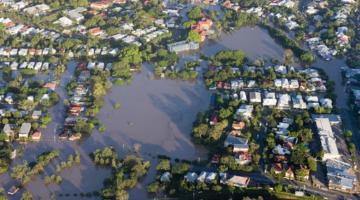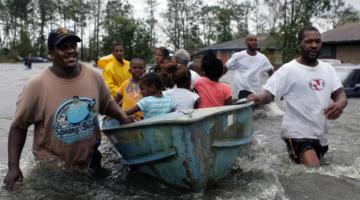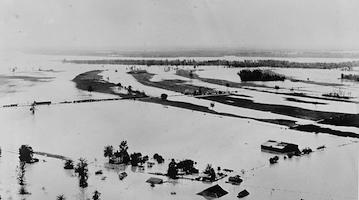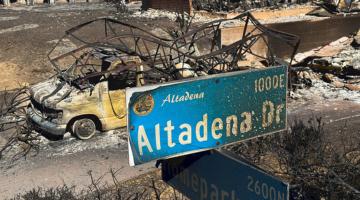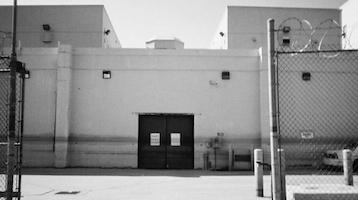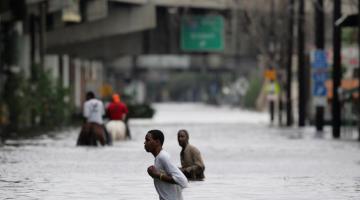Twenty years after Katrina, the disaster stands not as an anomaly but as a blueprint. Its aftermath reveals a template for imperial domination, where "natural" disasters become pretexts for militarization, displacement, and the denial of the right of return to Black and Brown communities worldwide.
“Thus, the term imperialism draws attention to the way that one country exercises power over another, whether through settlement, sovereignty, or indirect mechanisms of control.” - Walter Mignolo
New Orleans remains one of the most unique places in the world - there is simply no place like it in that it’s arguably the only place in the world that is an expression of the daily collisions of celebration/joy, creation, and culture with melancholy/tragedy, destruction, and barbarism associated with cultural appropriation and deracination. This year marks the 20th anniversary of Hurricane Katrina, which we know was less about the storm itself and more about the series of machinations after the storm that metamorphosed New Orleans, potentially forever.
Commemorating Katrina and its aftermath in 2025 comes at a time when a series of anthropogenic calamities from the genocide, ethnic cleansing and apartheid in Palestine, to the militarized federal takeover of Washington, D.C. (with the threat of more cities, such as Chicago, to follow) as part of a larger fascist consolidation effort are all exacerbated by an accelerated climate crisis that further elucidates the praxis of Imperial domination, which continues to oppress colonized and marginalized peoples across the world. Imperial domination can be described as the methods in which oppressive forces - including nation states and corporations (in many cases cooperating with one another)—exercise power over oppressed people through settlement, forced displacement, and other forms of socio-economic, environmental, and cultural warfare.
Informed and influenced by the psychopathology of white “supremacy,” the praxis of imperial domination is responsible for denying thousands of New Orleaneans, the vast majority of them Black and poor folk, from a right of return to their home city in the same way that Palestinians are prevented from returning to theirs. And we are observing similar trends taking place in cities like Altadena, California a majority Black and Brown poor and working class community, still reeling from a historic wildfire that incinerated entire neighborhood blocks, where reports about Black working class families are being approached with low-ball offers for their damaged and destroyed homes by real estate speculators as part of the “rebuilding effort” are emerging. By some accounts, vulture capitalist real estate corporations have already acquired 50% of the city’s fire-damaged homes.
Whether it’s hurricanes, wildfires, outright genocide/ethnic cleansing, or everyday gentrification, the lessons of Katrina are instructive in demonstrating that communities from New Orleans, to Palestine, Altadena, Washington, D.C., Haiti and many others form a synergy of sacrificed people and sacrificed communities that are forged together by their common experiences as victims of so-called disaster capitalism that’s exercised as part of a larger global initiative of racial capitalism via white “supremacy” ideology, patriarchy, and colonialism. That said, there is another theme that synergizes these communities - the denial of their human rights, which is part of a larger denial of their basic humanity by numerous actors, corporations, and institutions that uphold the capitalist dictatorship and its prioritization of profits over people and the planet’s ability to sustain life.
As part of covering the week of activities in New Orleans and surrounding areas dubbed simply as, “Katrina 20,” I attended and took part in a series of panels hosted by Cooperation Jackson with local residents and organizers as well as international experts on the impacts of colonization and neocolonialism on human rights in the context of Katrina and other past and current global struggles against oppression.
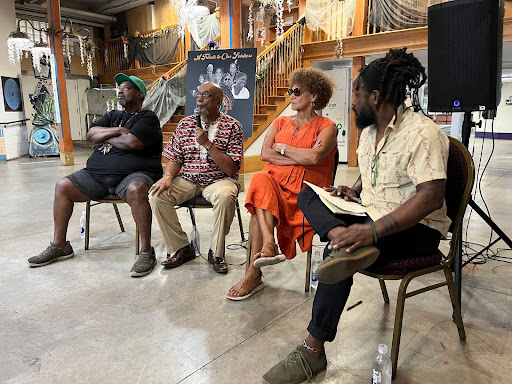
From Right to Left: Local organizer and life-long New Orleanean, M. Endesha Juakali; Black Alliance for Peace and People(s) North_South Human Rights Project founder, Ajamu Baraka; Founder of Franz Fanon Foundation, Mireille Fanon Mendes-France, ; Black Alliance for Peace Member, Anthony Karefa Rogers-Wright.
A common theme of the panels and discussions was the idea that local conditions are informed and defined by specific connections of a given locale to larger and broader systems of oppression. As Cooperation Jackson founder, Kali Akuno put it, “make the connections by making the connections.” For instance, when considering the fact that the Lower 9th Ward community once enjoyed one of the highest Black home ownership rates in the nation yet only 33% of the 2005 population has returned, it is impossible to not establish connections to the pre-Nakba Palestinian population of present-day Israel and the consequences of its forced displacement.
The similarities between Palestinians who were forced from their homes by acts of zionist terrorist organizations including Irgun, Haganah, and the Stern Gang (groups that later became the modern Israeli Defense Force), and the forced evacuation of Black New Orleaneans by local law enforcement, the national guard, and active duty soldiers, in many cases with guns drawn, are striking and vindicate the idea that the Nakba, like Katrina, and the genocide and forced displacement and relocation of people Indigenous to the present-day United States were all initiatives carried out through the the praxis of imperial domination.
Imperial domination commonly utilizes militarization to exert control over oppressed people as forces from local police and the military facilitate displacement as well as control their movements. “Natural” disasters and crises set a near perfect stage and rationalization for increased militarization of a given area. Just as checkpoints that have been enacted in Washington, D.C. are similar to the checkpoints in the Occupied West Bank, in that while the stated reason for them is to address “crises” of crime and terrorism, the checkpoints exist and operate in similar fashion because forces that uphold and sustain the U.S. empire have the same goal of imperial domination as the IDF- so much so that they coordinate with one another sharing data, weapons, capital, and overall tactics with one another. This is evidenced by the fact that the New Orleans police department, along with those from other cities, were training with the IDF years and months before Katrina even hit the Gulf South.
Compounding this point, Rania Salem of the US Palestinian Community Network reminds us, “Within these programs [with the IDF], worst practices are shared to promote and extend discriminatory and repressive policing practices that already exist in both countries.” She continued, “U.S. forces take whatever is working in Israel and they bring it here and inflict it on Black and Brown people.” Salem reminds us how imperial domination does not emerge out of thin air - in most cases it builds off existing material conditions that were in place before any “natural” disaster or crisis takes place. BAP Coordination Committee Chair, Jacquie Luqman recently made this point during a recent interview with Black Agenda Radio explaining how various policies and regulations implemented by Washington, D.C. mayor, Muriel Bowser, including youth curfews and elements of a local crime bill put local militarized forces in place before the president took over the D.C. police department and dispatched the national guard and law enforcement officials from federal agencies. In similar fashion, the material conditions in New Orleans prior to Katrina - 23% of the population living in high poverty neighborhoods, approximately 40% of the city’s population living below the federal poverty line, and the loss of nearly 50,000 jobs between 1980 and 2023 - set the stage for the praxis of imperial domination as a response to the storm.
Of all the tactics associated with imperial domination, the one that most stands out and connects the experiences of oppressed people is that of dehumanization and denial of human rights as articulated in various international human rights laws. The 1998 Guiding Principles on Internal Displacement stipulate, “Once persons have been displaced, they retain a broad range of economic, social, cultural, civil and political rights, including the right to basic humanitarian assistance (such as food, medicine, shelter), the right to be protected from physical violence, the right to education, freedom of movement and residence, political rights such as the right to participate in public affairs and the right to participate in economic activities” (Principles 10-23). Additionally, the principles declare, “Displaced persons also have the right to assistance from competent authorities in voluntary, dignified and safe return, resettlement or local integration, including help in recovering lost property and possessions. When restitution is not possible, the Guiding Principles call for compensation or just reparation” (Principles 28-30).
The Federal Emergency Management Agency (FEMA) showed the entire world how Black New Orleaneans did not qualify for protections and assurances under the Guiding Principles on Internal Displacement. According to a 2022 report prepared by the research firm EBSCO, “In addition to government incompetence, racism played a role in the emergency response to Katrina. The hurricane and its aftermath exposed deep socioeconomic and racial divisions in New Orleans,” the report continues, “Those most in need and most vulnerable, critics argued, were Black, and race played a crucial role in why government officials did not move quickly enough to provide assistance.” FEMA’s response to Katrina is similar to the global response to the genocide and ethnic cleasing in Palestine, and various crises in other intentionally underdeveloped nations, and continiues a long trend of more humane responses and sense of urgency for people who are considered white versus those who are not. I recently discussed this point in explaining the juxtaposition of the global response between the Russia/Ukraine war and the execrable situation in Gaza.
To this end, it’s interesting that current and former FEMA staffers recently sent a letter to Congress and the White House. The letter, entitled, “The FEMA Katrina Declaration,” warns that due to the policies of the Trump administration the agency has abandoned its reforms designed to correct the agency's mistakes in responding to the 2005 hurricane. The letter, in part, states, "We the undersigned — current and former FEMA workers — have come together to sound the alarm to our administrators, the US Congress, and the American people so that we can continue to lawfully uphold our individual oaths of office and serve our country as our mission dictates." But what lessons did FEMA really “learn” since its failures in 2005, which included the failure to uphold the Guiding Principles of Internal Displacement and saw scores of Black and poor families housed in “toxic trailers” that contained formaldehyde levels 75 times higher than the threshold for workplace safety - something FEMA admitted they knew.
And a 2024 Harvard Kennedy School report concluded, “Black Americans receive less Federal Emergency Management Agency (FEMA) relief funding on average than their white counterparts. Their communities take longer to recover in the wake of natural disasters and they are less likely to relocate to areas with fewer disasters,” demonstrates that it’s less that FEMA learned any “lessons” from 2025 and more that Black New Orleaneans understand more than ever that they are seen as inhuman, undeserving of human rights and, therefore, disposable. This understanding is key to comprehending the myriad ways that sacrificed communities the world over are connected by the catastrophe of white “supremacy” and racial capitalism. As Sally Ray of the Center for Disaster Philanthropy named in 2024, “I think we need to quit being uncomfortable talking about the intersection of climate change, racism, and disasters. The reality is we have long systemic racist problems across our country, and because of these things, when a disaster comes, it’s much more devastating.”
The insouciant letter from FEMA staffers to Congress and the White House showcase another tactic utilized as part of the larger praxis of imperial domination - narrative revision and narrative control. Whether it’s the Trump Administration attempting to re-write the story of the U.S.’s genocidal activities and chattel slavery, the actual crime rates in D.C. (that have been falling precipitously), a concerted effort by the zionist industrial complex to denyIsrael’s starvation of Gaza, imperial domination has long understood that controlling the narrative, even by fabrication, is key to controlling the oppressed masses and responses to disasters and other crises. Yet, sometimes there is truth to be found in revisionist history as corporate media outlet CNN just showed in a recent television documentary it produced about Katrina. The documentary entitled, New Orleans: Soul of a City discusses how the Superdome, once a symbol of tragedy, became a symbol of New Orleans’ resilience as well as a larger narrative about the city’s “rebirth.” It’s true that New Orleans was reborn, but what is not discussed by CNN and other corporate outlets is that this rebirth came at the expense of Black and poor New Orleaneans, nor the fact that repairing the Superdome took precedence over repairing human rights and communities in ways that allowed displaced persons to return to their homes pursuant to the Guiding Principles of Internal Displacement. The truth of CNN’s special is that imperial domination will always prioritize restoring nominal functions of capitalism over nominal functions of services and humanitarian aid for impacted people.
Only a people(s) centered human rights approach and framework can confront and dismantle the praxis of imperial domination. BAP’s five point approach to addressing the interlinked crises of climate change and militarism offers key intervention tactics and initiatives:
1) Develop work through the campaign demand: “Expose and confront the climate and environmental war on our peoples and lands, by prioritizing the dismantling of climate change’s root causes; the structures of capitalism, colonialism, patriarchy, through a context of U.S.-led militarism and imperialist conflict;”
2) Connect climate and environmental liberation to the priority campaign demand: “End economic warfare on our people and neighborhoods: Defend African/Black, working class and poor people, and our neighborhoods;
3) Connect climate and environmental movements and initiatives to our campaign objective: “Dismantle the militarized infrastructure of the U.S.-led imperialism and the U.S./EU/NATO Axis of Domination”, which includes fighting Cop Cities, U.S. military bases, and NATO;
4) Support, mobilize, and/or catalyze self-defense coalitions that build organized local and regional resistance to militarization, ICE raids, state violence generally, and invasive surveillance. These coalitions can also mobilize to provide care for neighbors everyday and in times of crisis; and
5) Fight to realize People(s)-Centered Human Rights, those non-oppressive rights that reflect the highest commitment to universal human dignity and social justice that individuals and collectives define and secure for themselves and Collective Humanity through social struggle
Understanding how imperial domination has established a global synergy of oppression is necessary to realize the desired synergy of the liberated. To this end, it’s very encouraging to observe many of the events and discussions at Katrina 20 lifting up the similarities with and connections to oppressed people domestically from Los Angeles to D.C., and globally from Palestine, Africa, and Haiti and otherwise incorporating elements of BAP’s five point approach to climate and militarism. It will take nothing short of a global revolution to confront the praxis of imperial domination. As Luca Tavan writes, “International revolution isn’t just a romantic dream, but an urgent necessity. It’s the only means by which capitalism can be permanently uprooted and replaced with socialism. This is because capitalism, unlike previous class societies, is a globally integrated system.” And just as capitalism, the system that is sustained and protected by imperial domination, is a globally integrated system, Katrina, even 20 years later, in concert with the contemporaneous expressions of oppression we are witnessing the world over, will require a globally integrated struggle for peoples-centered human rights and a proletarian dictatorship that usurps imperial domination.
No Compromise
No Retreat
Anthony Karefa Rogers-Wright is an international climate and environmental liberation advocate, a racial justice practitioner, and a writer and policy expert residing in the United States with his family and their mischievous cat, “Evil” Ernie. He is a proud and active member of the Black Alliance for Peace and the Movement for Black Lives. His radio program, “Full Spectrum with Anthony Rogers-Wright,” airs on the Mighty WPFW network every Tuesday at 6:00 PM EST.

